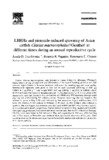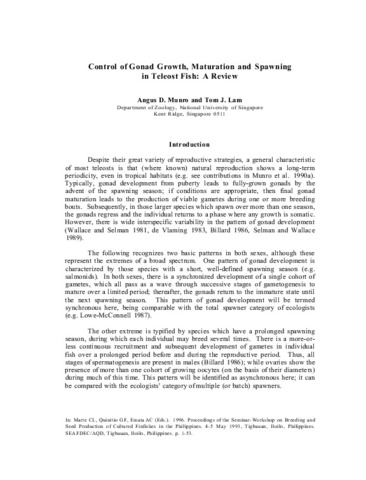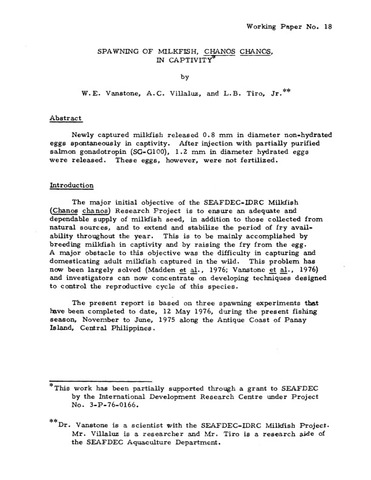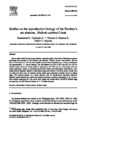LHRHa and pimozide-induced spawning of Asian catfish Clarias macrocephalus (Gunther) at different times during an annual reproductive cycle
Share
Abstract
Captive Clarias macrocephalus were induced to spawn during the off-season (February), before (May), during (August) and end (November) of the natural breeding period to test their seasonal responsiveness to hormone treatment, and assess the resulting egg and larval quality. Intramuscular injections were given to five fish in each treatment consisting of 0.05 μg LHRHa + 1 μg PIM g−1 body weight (BW), 0.05 μg LHRHa, 1 μg PIM, or LHRHa vehicle (0.9% NaCl) and PIM vehicle (1 dimethylsulfoxide: 9 propylene glycol, v/v). At any phase of the annual cycle, only fish injected with a combination of LHRHa and PIM spawned, although initial egg size was similar among fish within a season. However, initial egg size was largest in fish induced to spawn in May (1.59 mm), followed by fish induced in August and November (1.54 mm), and smallest in fish induced in February (1.49 mm). All fish ovulated when induced to spawn in May and August, but ovulation rates decreased to 80% and 60% when fish were injected in November and February, respectively. Catfish induced to spawn in May, August and November had higher egg production, fertilization and larval survival rates than the fish induced in February. Hatching rates were higher in fish induced in May and August than in February, while hatching rate of fish induced in November was similar to those spawned at other times of the year. These results provide useful information regarding the broodstock management and hatchery production of C. macrocephalus.
Suggested Citation
Tan-Fermin, J. D., Pagador, R. R., & Chavez, R. C. (1997). LHRHa and pimozide-induced spawning of Asian catfish Clarias macrocephalus (Gunther) at different times during an annual reproductive cycle. Aquaculture , 148(4), 323-331. https://doi.org/10.1016/S0044-8486(96)01423-8
Subject
Collections
- AQD Journal Articles [1249]
Related items
Showing items related by title, author, creator and subject.
-
Control of gonad growth, maturation and spawning in teleost fish: A review
Munro, Angus D.; Lam, Tom J. (Aquaculture Department, Southeast Asian Fisheries Development Center, 1996)Despite their great variety of reproductive strategies, a general characteristic of most teleosts is that (where known) natural reproduction shows a long-term periodicity, even in tropical habitats (e.g. see contributions ... -
Spawning of milkfish, Chanos chanos, in captivity
Vanstone, William E.; Villaluz, Antonio C.; Tiro Jr., Leonardo B. (Aquaculture Department, Southeast Asian Fisheries Development Center, 1976)Newly captured milkfish released 0.8 mm in diameter non-hydrated eggs spontaneously in captivity. After injection with partially purified salmon gonadotropin (SG-G100), 1.2 mm in diameter hydrated eggs were released. These ... -
Studies on the reproductive biology of the Donkey's ear abalone, Haliotis asinina Linné
Capinpin, Emmanuel C., Jr.; Encena II, Vincent C.; Bayona, Nestor C. (Elsevier, 1998)The sex ratio, initial size at sexual maturity, spawning period, time interval between successive spawnings and fecundity of the Donkey's ear abalone, Haliotis asinina were studied. The sex ratio of wild abalone (>60 ...




